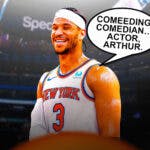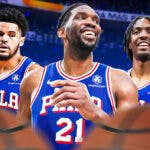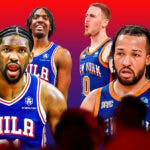On May 12, 1985, the New York Knicks won the NBA Draft Lottery, which basically meant they won the Patrick Ewing sweepstakes.
Ewing was considered to be a generational talent coming out of Georgetown at the time, and based on how dominant he was during his NBA career, that turned to be an accurate assessment.
Say whatever you want about the conspiracy theories about how the Knicks got the No. 1 overall pick to begin with, but that's not what this is about. They got the pick. Move on.
Ewing promised to deliver a championship to New York, which was something he failed to do during his 15 years with the club. It's not like he didn't come close. He led the Knicks to the finals in 1994, where they lost to the Houston Rockets. Then, in 1999, an Achilles injury ended Ewing's playoff run as New York marched to a finals appearance against the San Antonio Spurs, where it fell to the Twin Towers of Tim Duncan and David Robinson.

Then there were all of those years where Ewing's Knicks were eliminated by Michael Jordan's Chicago Bulls. That happened five times throughout Ewing's tenure, as a matter of fact.
So, just why weren't the Knicks able to win a title during Ewing's stay?
Well, there were a variety of reasons.
First of all, Jordan stood in the way. Again, between 1989 and 1996, the Bulls bounced the Knicks from the playoffs five times. Four of those losses came in the second round. The fifth came in the Eastern Conference Finals in 1993.
You can criticize Ewing all you want for his postseason failures, but everyone was losing to Jordan back then. The Indiana Pacers. The Miami Heat. The Cleveland Cavaliers.
Jordan didn't dominate the Knicks. Everyone in the East was left in his wake. He is the GOAT for a reason.
And the one year New York didn't have to deal with MJ in 1994? The Knicks advanced to the finals and met the Rockets, who were led by a center who was arguably a top five player of all-time (if not better) in Hakeem Olajuwon.
Olajuwon outlasted Ewing in seven games, but he made every big man in the NBA look foolish in the '90s. That included Shaquille O'Neal, David Robinson, Alonzo Mourning and Dikembe Mutombo. In a league where centers reigned king, Olajuwon was the best of the bunch, and Ewing had the misfortune of dealing with him the one season Jordan was retired.

So that's No. 1. Patrick Ewing was going up against some of the best players ever during his prime, and while that doesn't completely exonerate Ewing from not winning a ring, it's obviously one of the best excuses a player can have.
Second, it's not like Ewing had a ton of supporting talent.
While Jordan had Scottie Pippen, Karl Malone had John Stockton and Shawn Kemp had Gary Payton, Ewing didn't really have any All-Star caliber teammates.
Charles Oakley was tough, but he was more of an enforcer than anything else. Anthony Mason was a very good all-around player who was actually ahead of his time (think of him as a '90s version of Draymond Green), but the NBA landscape was not tailored for guys like him back then. John Starks? Knicks fans loved him and he was a very good defender, but offensively, he was really just an inefficient chucker.
Ewing didn't have that second star. He didn't have that guy to take the pressure off of him in big games. It was basically Ewing or bust for the defensive-oriented Knicks.
New York was gritty. It was physical. But it wasn't exorbitantly talented, and that lack of top-to-bottom talent cost the club dearly throughout much of the '90s.
Let's also not forget that Ewing dealt with injuries for much of the latter half of his career. He had knee surgery in 1995. He shattered his wrist in 1997. He had the Achilles problems.
For a man who was seven feet tall and around 250 pounds, those are devastating injuries, and ones that absolutely shortened his time in the league.

Who knows? Maybe if Patrick Ewing were healthy in 1999, the undersized Knicks would have given Duncan's Spurs more of a run instead of losing in five games. Don't give me this “Ewing theory” trash where some people say New York was better without him. That is complete and utter nonsense and is patently false.
Throughout his decade-and-a-half-long tenure in the Big Apple, Ewing averaged 22.8 points, 10.4 rebounds and 2.7 blocks per game while shooting 50.8 percent from the floor. His numbers in the playoffs were similar.
It seems hard to pin the blame on Ewing for the Knicks' failures when really, he was essentially all on his own.
Yes, Patrick Ewing failed to follow up on his oath to New York. Yes, he will forever be known as one of the best ringless players ever. But that is hardly all his fault.




